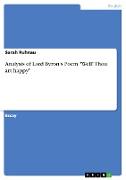- Start
- Analysis of Lord Byron's Poem "Well! Thou art happy"
Analysis of Lord Byron's Poem "Well! Thou art happy"
Angebote / Angebote:
Essay from the year 2010 in the subject English Language and Literature Studies - Literature, grade: 1, 3, Ruhr-University of Bochum (Englisches Seminar), course: Romantic Poetry, language: English, abstract: In the following essay I would like to analyse one of Lord Byron's earlier poems, namely "Well! Thou art happy" which was written in November 1808 and thus belongs to the epoch of romanticism. The poem involves a poetic speaker who laments a love relationship to a woman that has come to an end. In his sadness, he is torn between the love he still feels and the jealousy that occurs inside of him when he is concerned with his beloved's husband or their child. However, he is aware of the fact that it is necessary for him to get over the end of the relationship. As mentioned above, "Well! Thou art happy" belongs to Byron's early po-ems as it was written in 1808 and in general, Byron's poems written before 1809 are consid-ered as early poems (cf. Marchand, 15). Apart from that the poem itself includes some hints which point out its early stage. In line 22 the poetic speaker talks about his "boyish flame" and in line 33 he describes his "early dream" (cf. Byron, 83). Hence, the poetic speaker seems to be a fairly young man who is not very experienced yet. This suits the typical characteristic of Byron's early poems. Marchand calls it a "juvenile verse" that describes "youthful inno-cence" as well as "the fictions of flimsy romance" (cf. Marchand, 15 f.). Before I will begin to analyse the poem, I will start with a subchapter about its formal part.
Folgt in ca. 10 Arbeitstagen
